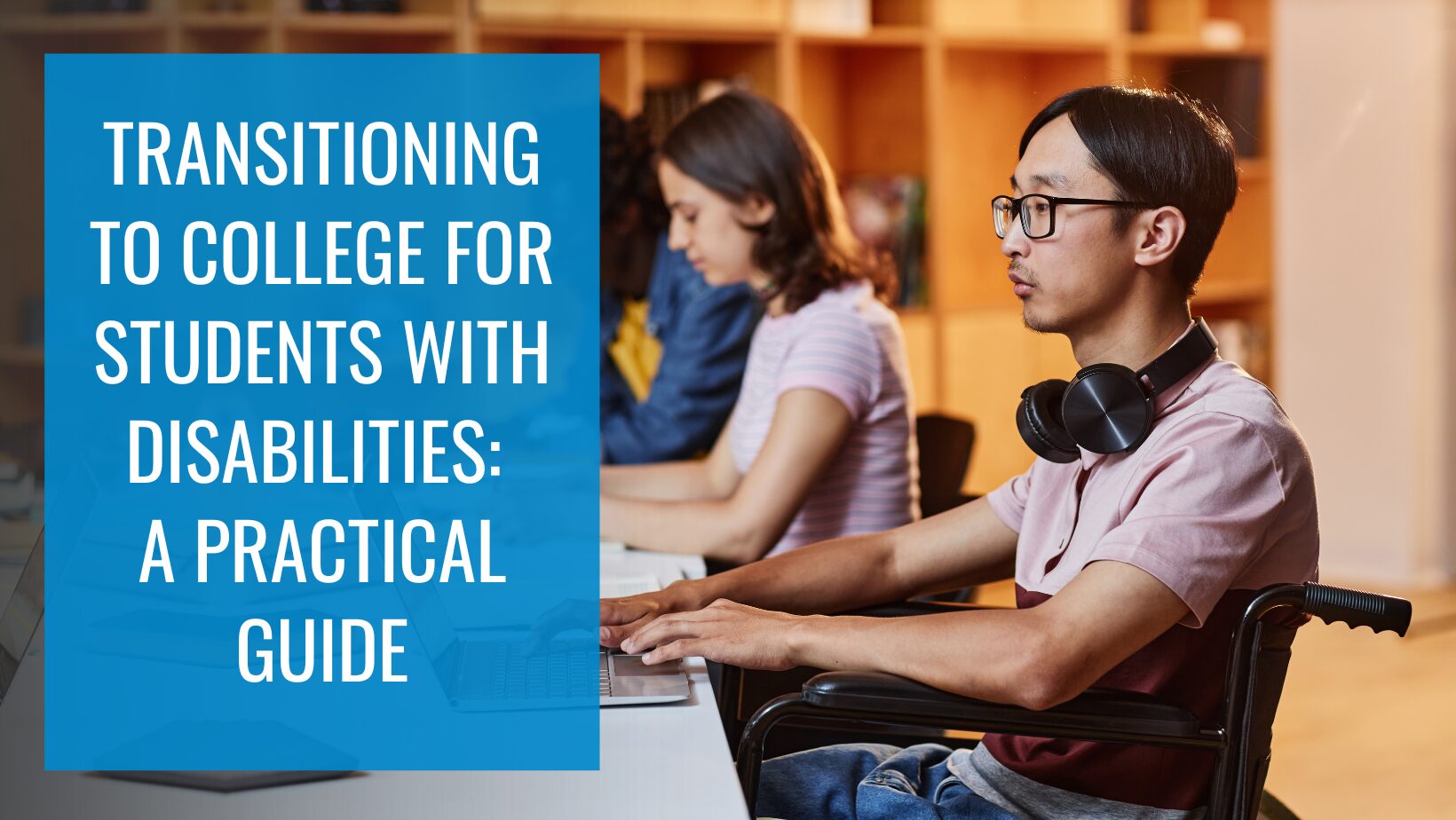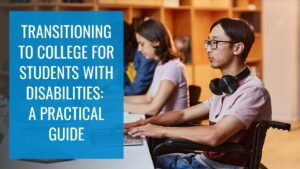Going from high school to college is exciting but can also feel overwhelming, especially for students with disabilities and their families. College life brings new academic expectations, social opportunities, and independence, and the way support is provided often changes dramatically from what students experienced in high school.
This guide is designed to make that transition smoother by offering clear, practical advice. You will learn about the key differences between high school and college disability services, steps to prepare during high school, and resources tailored to specific disabilities. Additionally, we provide answers to common questions from families and students about postsecondary programs and services, so you can feel confident navigating the next stage of education.

In This Article:
- Key Differences Between High School and College Disability Services
- Preparing During High School: Step-by-Step
- Resources by Type of Disability
- Frequently Asked Questions (PACER)
- Final Thoughts
Whether you are a student preparing to take the lead in advocating for your needs or a family member looking to support your child, this guide will help you understand what to expect and how to make the most of available resources.
1. Key Differences Between High School and College Disability Services
Transitioning from high school to college is a big step for any student, and for students with disabilities, understanding how support works in college is essential. While high schools provide a structured environment where the school is responsible for ensuring accommodations, colleges operate differently.
Academic Accommodations
- In high school, students receive a free appropriate public education (FAPE), which includes accommodations written into IEPs or 504 Plans. Teachers and staff are generally proactive in providing support.
- Colleges provide “reasonable accommodations” but are not required to provide FAPE. This means students need to initiate requests, provide documentation, and follow up with disability services offices.
Disclosure
- In high school, support is generally provided without the student needing to advocate for it constantly.
- In college, students must self-disclose their disability to receive accommodations. This is a personal choice, but without disclosure, students will not receive formal support.
Self-Advocacy
- Colleges expect students to communicate their needs, schedule meetings, and manage accommodations independently. Building self-advocacy skills is essential before graduation from high school.
Students’ Rights
- Section 504 of the Rehabilitation Act and Title II of the Americans with Disabilities Act protect students from discrimination.
- Colleges cannot deny admission or educational opportunities solely because of a disability.
- Students have the right to reasonable accommodations, accessible facilities, and non-discriminatory practices in housing and programs.
2. Preparing During High School: Step-by-Step
Early preparation helps students move confidently into college life. Here’s a practical roadmap.
Step 1: Gather Important Documents
- IEP or 504 Plan
- Recent evaluations (psychological, educational, or medical)
- Documentation of standardized test accommodations
Having these on hand ensures colleges have the necessary information to provide support efficiently.
Step 2: Ask Key Questions
- What accommodations are available in classes and testing?
- How does the disability services office handle requests?
- Are peer mentoring or social support programs available?
- What technology or assistive devices are supported?
Step 3: Build Essential Skills
- Self-advocacy: Practice requesting help, explaining needs clearly, and following up when necessary.
- Time management: Use planners, calendars, and reminder systems to manage coursework and deadlines.
- Study strategies: Develop note-taking, reading comprehension, and organizational techniques.
Rights Awareness
- Students should know they are entitled to equal access, reasonable accommodations, and accessible housing if provided to non-disabled peers. This knowledge allows them to advocate effectively and confidently.
3. Resources by Type of Disability
ADHD
ADHD, or Attention-Deficit/Hyperactivity Disorder, is a condition that affects focus, impulse control, and organization. In college, students with ADHD may find it challenging to manage assignments independently or stay on top of deadlines. Support can include structured schedules, quiet testing spaces, and extended time on exams. Organizations like CHADD provide strategies for self-advocacy and academic success, while college disability services offices can help arrange accommodations tailored to individual needs.
Learning Disabilities
Learning disabilities, such as dyslexia, dyscalculia, or dysgraphia, affect how a person processes information, which can impact reading, writing, or math. Transitioning to college may be difficult because students need to develop independent study strategies and access tools like note-taking support or assistive technology. Resources like LD Online and NCLD offer guidance for study strategies, academic accommodations, and planning for success.
Visual Impairments
Students with visual impairments may have partial or total vision loss, which can affect reading and navigating campus independently. College may require accessible textbooks, screen readers, braille materials, and orientation to campus layout. The American Foundation for the Blind provides guidance on assistive technology, while Accessible Media Services offers textbooks in braille or audio format. Disability services offices can coordinate accommodations to ensure full access to academic programs.
Hearing Impairments
Hearing impairments range from partial to total hearing loss, affecting communication and participation in standard classroom settings. College students may need captioning, sign language interpreters, or assistive listening devices to fully engage in lectures and group discussions. The National Association of the Deaf offers guidance for transitioning to college, and the Registry of Interpreters for the Deaf helps locate qualified interpreters.
Mobility / Physical Disabilities
Mobility or physical disabilities include conditions that affect movement or strength, such as spinal cord injuries or cerebral palsy. Students may need accessible classrooms, labs, adaptive equipment, or transportation support. The United Spinal Association provides guidance on independent living and campus accessibility, and disability services offices can ensure that all facilities and housing meet accessibility standards.
Chronic Health Conditions
Chronic health conditions, like diabetes, epilepsy, or asthma, require ongoing management that can affect attendance and participation. College students may need flexible scheduling, medical accommodations, or emergency support plans. The College Health Guide offers tips for managing chronic conditions, and campus health and disability offices coordinate accommodations for academic success.
Autism Spectrum Disorder (ASD)
Autism Spectrum Disorder affects social communication, behavior, and sometimes sensory processing. College students with ASD may need support for social integration, executive functioning, and structured routines, in addition to academic accommodations. Autism Speaks provides transition guides and support networks, while college disability services offices can help implement individualized academic and social support.
Mental Health Conditions
Conditions such as anxiety, depression, or bipolar disorder can influence academic performance and campus life. Students may need counseling, accommodations for coursework or testing, and strategies for managing stress. Organizations like Active Minds support mental health awareness and peer networks, and campus counseling and disability services provide direct academic and wellness support.
Quick-Reference Chart: Resources at a Glance
To help families and students quickly find relevant resources, here is a visual summary of disability types, transition considerations, and key support resources:
| Disability | Transition Considerations | Key Resources & Links |
| ADHD | Managing attention, time management, independent organization | CHADD – https://chadd.org College Disability Services Offices (extended time, quiet testing) |
| Learning Disabilities | Reading, writing, or math challenges; independent study strategies | LD Online – https://www.ldonline.org NCLD – https://www.ncld.org |
| Visual Impairments | Accessible textbooks, screen readers, braille materials | American Foundation for the Blind – https://www.afb.org Accessible Media Services – https://www.amsmedia.org |
| Hearing Impairments | Captioning, interpreters, assistive listening devices | NAD – https://www.nad.org RID – https://www.rid.org |
| Mobility / Physical Disabilities | Campus accessibility, transportation, adaptive equipment | United Spinal Association – https://www.unitedspinal.org Campus Disability Services Offices |
| Chronic Health Conditions | Flexible scheduling, medical accommodations, emergency planning | College Health Guide – https://www.collegehealthguide.com Campus Health & Disability Offices |
| Autism Spectrum Disorders | Social integration, executive function, academic support | Autism Speaks – https://www.autismspeaks.org College Disability Services Offices |
| Mental Health Conditions | Stress management, counseling, accommodations for psychiatric needs | Active Minds – https://www.activeminds.org Campus Counseling & Disability Services |
4. Frequently Asked Questions (PACER)
As students and families prepare for the transition from high school to postsecondary education, it is important to understand that the rights and responsibilities shift in significant ways. While many parents are familiar with the Individuals with Disabilities Education Act (IDEA), fewer know about the protections provided by the Americans with Disabilities Act (ADA) and Section 504 of the Rehabilitation Act. PACER, a national organization that supports families of children and young adults with disabilities, frequently addresses common concerns. Below are three of the most frequent questions they receive.
Q. How does the ADA affect postsecondary programs?
A. Title II of the ADA covers state-funded programs such as universities, community colleges, and career and technical schools. Title III of the ADA applies to private colleges and vocational programs. If a postsecondary program receives federal funding (which most do), it is also subject to Section 504 of the Rehabilitation Act, which requires schools to make programs accessible to qualified students with disabilities.
Q. What are the differences between the ADA and Section 504?
A. In practice, there are few differences for most postsecondary programs. Section 504 applies only to programs receiving federal financial assistance, but nearly all colleges and universities fall into that category. The ADA Title II requirements for public institutions were modeled after Section 504. Private institutions that do not receive federal funding are not bound by Section 504 or ADA Title II, but under Title III they must still provide reasonable accommodations, even if the standards are somewhat less extensive.
Q. How do the ADA and Section 504 affect admissions requirements?
A. Postsecondary institutions cannot exclude applicants with disabilities or impose eligibility requirements that screen them out. Applications cannot ask about a history of disability or mental illness. Schools may apply safety standards, but these must be based on actual risks rather than assumptions or stereotypes. It is also illegal for schools to treat students with disabilities differently because of insurance concerns, unless based on sound actuarial data or actual experience.
Final Thoughts
The transition to college can feel challenging, but with preparation, knowledge, and support, students with disabilities can thrive academically and socially. By understanding key differences from high school, building self-advocacy skills, gathering necessary documentation, and utilizing tailored resources, students and families can approach this next chapter with confidence. If you’d like additional assistance from a college admissions consultant, Solomon can help. Contact us today.
References
- U.S. Department of Education, Office for Civil Rights. Transition of Students with Disabilities to Postsecondary Education. Retrieved from http://www2.ed.gov/about/offices/list/ocr/transition.html
- Washington State GEAR UP. (2025). Preparing Students with Disabilities for College. Retrieved from https://gearup.wa.gov/sites/default/files/resources/preparing_students_with_disabilities_%202025.pdf
- DO-IT, University of Washington. (n.d.). Preparing for College: Online Tutorial. Retrieved from https://web.archive.org/web/20210414192304/https://www.washington.edu/doit/preparing-college-online-tutorial
- HEATH Resource Center, George Washington University. (n.d.). A Parent’s Guide to the Transition to Postsecondary Education. Retrieved from https://web.archive.org/web/20221006031431/https://www.heath.gwu.edu/parents-guide-transition
- Tulsa Community College. Disability Services: High School vs. College. Retrieved from https://web.archive.org/web/20221006031431/https://www.tulsacc.edu/support/accessibility-resources/disability-services-high-school-vs-college
- U.S. Department of Education. (2020). Policy Guidance on the Transition to Postsecondary Education and Employment for Students and Youth with Disabilities. Retrieved from https://sites.ed.gov/idea/idea-files/policy-guidance-transition-guide-postsecondary-education-employment-students-youth-disabilities-august-2020/
- U.S. Department of Health & Human Services. Section 504 of the Rehabilitation Act of 1973. Retrieved from https://www.hhs.gov/civil-rights/for-individuals/disability/section-504-rehabilitation-act-of-1973/index.html?utm_source=chatgpt.com
- ADA.gov. Title II of the Americans with Disabilities Act. Retrieved from https://www.ada.gov/law-and-regs/ada/?utm_source=chatgpt.com
- Affordable Colleges Online. Resources for Students with Disabilities. Retrieved from https://www.affordablecollegesonline.org/college-resource-center/resources-for-students-with-disabilities/
- Accredited Online Colleges. Accredited Online Colleges and Disability Education. Retrieved from https://www.accreditedonlinecolleges.org/resources/accredited-online-colleges-and-disability-education/
- PACER Center. (2025). Frequently Asked Questions about Postsecondary Programs and Services for Students with Disabilities. Retrieved from https://web.archive.org/web/20250216215515/https://www.pacer.org/transition/resource-library/publications/NPC-42.pdf

All of our blog posts are written by Former College Admission Officers who serve as members of our admission consultant team.



